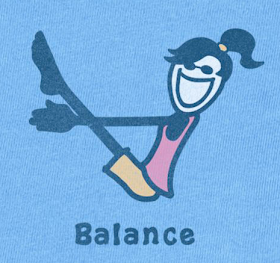
T-shirt from Life is Good
Work/life balance has been in the news a lot recently. I don't want to weigh in on whether or not Marissa Mayer made the right decision in ending work-at-home arrangements for Yahoo employees, for now; it's a complicated situation, and I can see both sides of the argument. Nor do I want to address whether Sheryl Sandberg's book is good; I haven't read it, so I can't have any worthwhile opinion.
Rather, I'd like to point you to some of the more interesting commentary that's come out of the discussion of these two news items. These are all brief excerpts; you may want to go read the full articles/blog posts.
The first is from the always-controversial Penelope Trunk, who supports Marissa Mayer. (Thanks for Vicki Brown for pointing me to this one.)
If you want to work at a company where people are doing big and important things, you have to give up everything. It’s okay to say that. ...Trunk also has a second post — this one focused on Sandberg — where she talks about the 100-hour workweeks she used to put in.
The workforce divides into two sides: people who try very hard to decrease the conflict in their life between work and home, and people who try very hard to get to the top of the work world. You can’t do both. ...
Once we get honest about what you need to do to get to the top, we can start having a real discussion about how to make choices in adult life. The reality of today’s workforce is that if you want to have a big job where you have prestige and money and power, you probably need a stay-at-home spouse. Or two full-time nannies. Which means most people don’t have the option to go on the fast track, because most people have not set their lives up this way.
And then there's Sarah Lacy, who has a different reaction to Sandberg's book and the criticism it has received:
Work/life balance is just hard, and it’s hard for everyone who feels passionately about their careers and their children. Has been for a long time. Probably always will be. ...Finally, there's this reflection from Mary Louise Kelly, a former Pentagon correspondent for NPR:
Raising children is highly personal. It’s the nexus of everything unique about your life: your goals, your relationship with your spouse, your child’s needs, and even your religious beliefs. And yes, wealth plays a big role too, but it’s hardly the only determiner about whether or not a woman can “have it all.” Put another way, of course Sandberg can’t tell you how to have it all. But it’s not because she’s rich. It’s because you aren’t Sheryl Sandberg. ...
Every woman I know who feels like she “has it all” — and there are many — has done it in a unique way.
My son needed me, and I was in a helicopter halfway around the world, gazing down over the snarled traffic of Baghdad. ...Related Post:
That night in Baghdad, I crawled into the bunk bed where I’d been assigned to sleep, in a trailer parked behind one of Saddam Hussein’s abandoned palaces, and I cried for hours. It seemed suddenly, blindingly obvious that it was time for Plan B. ...
I wonder if there isn’t room for a more expansive definition of female professional success. So many of the women I know are blending work and family in ways our mothers and grandmothers never dreamed possible. This seems to me worth celebrating, not sniffing at.
Work-Life Balance: Is It Time for a New Concept?
One of the mixed blessings of modern technology is it allows us to blend work and home life more than ever before. My Mom still talks about not being allowed personal calls at the bank she worked at, which is unthinkable these days, with our smartphones constantly at our sides.
ReplyDeleteAnd I agree: anyone who appears to have it all probably has a significant domestic support team, and a significant amount of guilt.